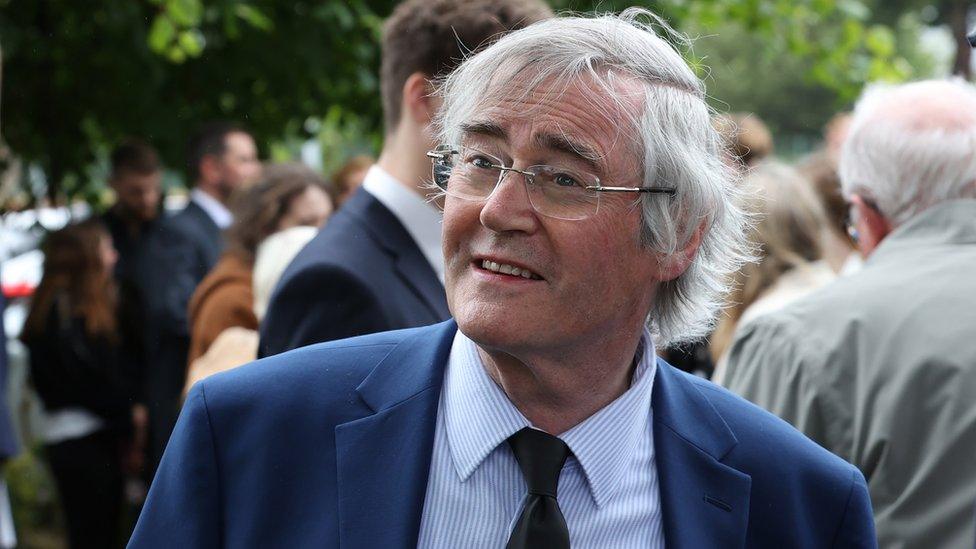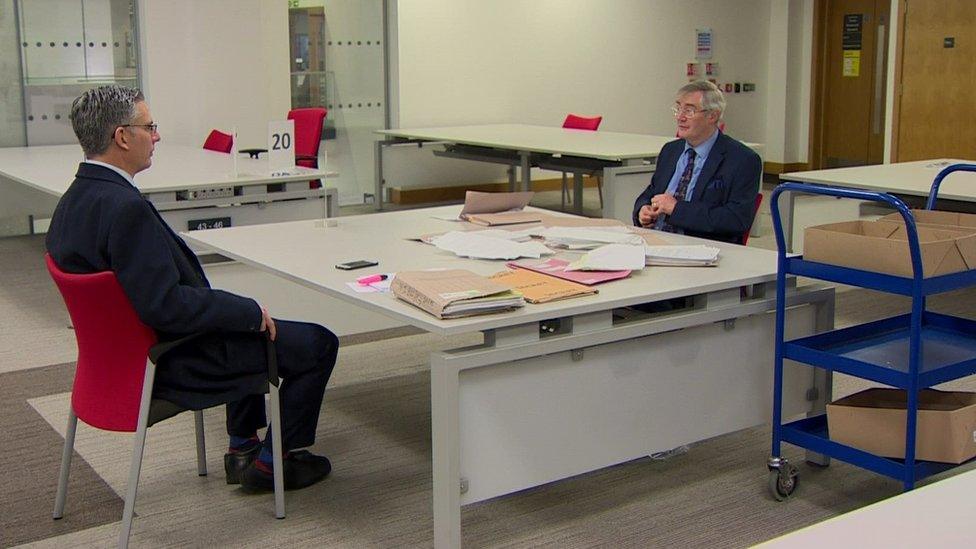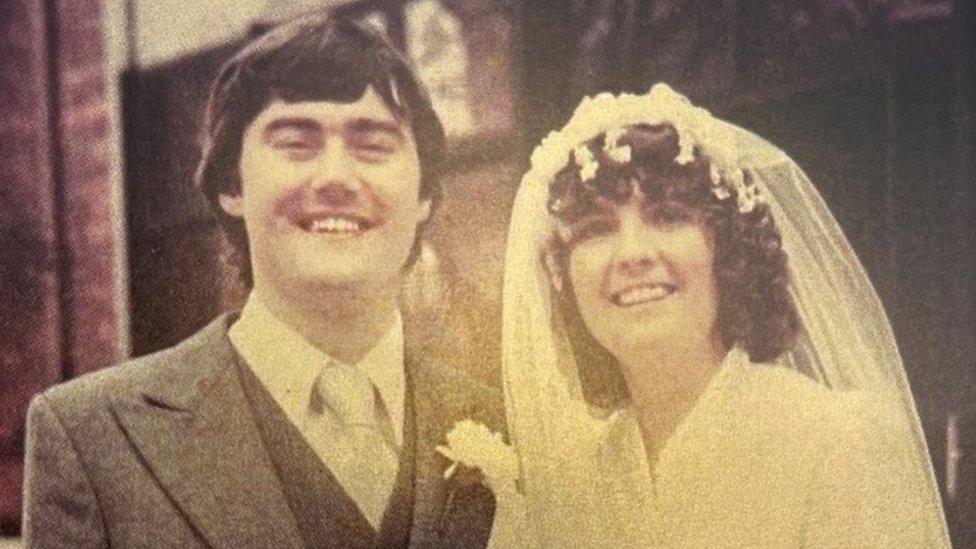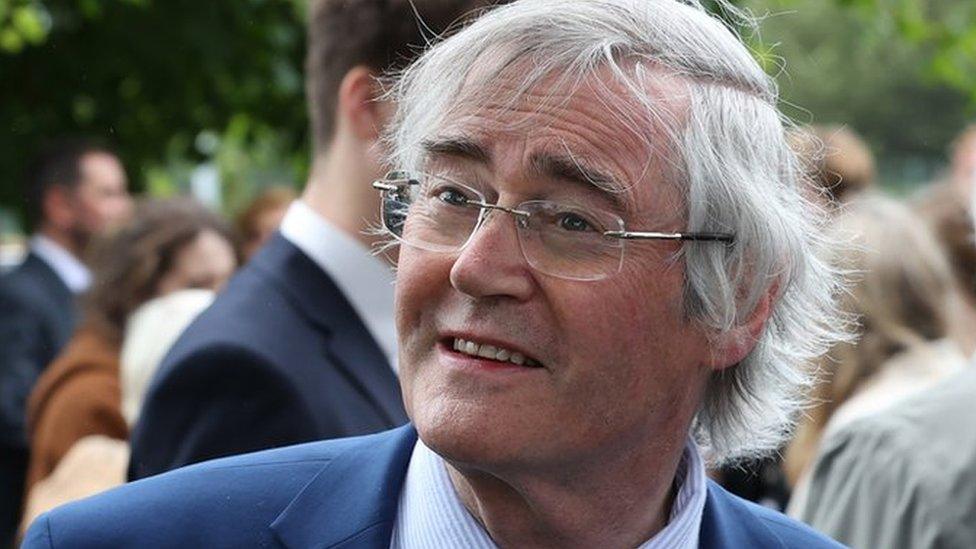Éamon Phoenix: The historian who became a national treasure
- Published

Éamon Phoenix was a regular contributor to a wide range of media organisations
After the historian Dr Éamon Phoenix died he was described by many as a "national treasure".
It was a recognition of his standing within academia and broadcasting - a voice of authority when explaining the complexities of Irish history.
He was particularly prominent in recent years due to the centenary of the establishment of Northern Ireland after the partition of Ireland in 1921.
Amongst the tributes on social media after he passed away at the age of 69, the phrase "national treasure" came up again and again.
Political commentator Alex Kane wrote, external: "Éamon was the loveliest of men, as well as being both ferociously well informed and relentlessly modest. Many of us had already awarded him 'national treasure' status."
Knowing Éamon, he would have blushed at the national treasure description. His inquiring mind may also have responded with a smile and a question "which nation"?
Éamon's work on Irish history often concentrated on the whole question of nationhood and national identity, particularly around the period from the 1916 Easter Rising to partition and the formation of Northern Ireland five years later.

Éamon Phoenix with Mark Simpson at Northern Ireland's Public Records Office
It was a pivotal chapter in history, as Irish republicans battled to cut ties with Britain, while unionists resisted.
One of the ways Éamon illuminated that period was by concentrating on the people, as well as the politics of the time.
In his many broadcast interviews and lectures, he focused on the personalities of key political figures like Edward Carson and James Craig on the unionist side, and Michael Collins and Eamon de Valera on the republican side.
He talked about their strengths and weaknesses, their physical characteristics, their families and even their childhood.
To understand the politician, you need to know the person, he often said. The micro helps to explain the macro.
At the same time, he enjoyed numbers. When it came to dates, he was a human encyclopedia.
I once interviewed him for BBC television for 45 minutes and he only stopped once, to double-check a date which he had just spoken about. It turned out, he had been right first time.
Speaking of dates, he had a fascinating take on when Northern Ireland was formally established.
Officially, 3 May 1921 is the designated day. The centenary of that date was marked last year as part of the government's programme of events to mark the 100-year anniversary.

Éamon Phoenix was a regular contributor to a wide range of media organisations
In his characteristically gentle way, Éamon argued there were a number of other possible dates.
He pointed out that the legislation which partitioned Ireland was given royal assent the previous year, even though it did not come into effect until May.
He also highlighted the fact that the Irish border was not legally confirmed until the Boundary Commission completed its work in 1925.
I remember interviewing him for BBC News NI in the back garden of his home in south Belfast on this very subject.
Such was his public appeal, a subsequent clip of him talking about the issue on Twitter, external received 37,000 views. Not bad for an historian.
He was popular on the TV and radio airwaves, and it was the same during his career in education.
Doc Phoenix's lessons
Before becoming a lecturer at Stranmillis University College in south Belfast, he was a teacher. One of the schools he taught in was St Malachy's College in north Belfast.
It is said that some pupils, who used to sneak out of school to avoid classes, would creep back in later in the day for a lesson if Dr Phoenix was teaching history.
He was known in the corridors of the school as 'Doc Phoenix'. At home, away from the spotlight, he was known as a devoted husband, father and grandfather.
A photograph of him and his wife Alice on their wedding day in 1980 was on the order of service at his funeral, at St Brigid's church in south Belfast.

A photograph of Dr Phoenix and his wife Alice on their wedding day in 1980 was on the order of service at his funeral
Parish priest Father Edward O'Donnell told mourners: "In spite of his extraordinary academic workload, and his commitment to so many projects, Éamon's first thoughts were always about his family."
After the service, friends shared their memories of him.
He was an historian who did not just have expertise, but the gift of communication and a wonderful turn of phrase.
This allowed him to share his knowledge in a way that was easy to listen to, and crucially, to understand.
That is why many said they regarded him as a national treasure.
It also why 13 November 2022, the day of his death, will go down as a sad day in history.
- Published14 November 2022
